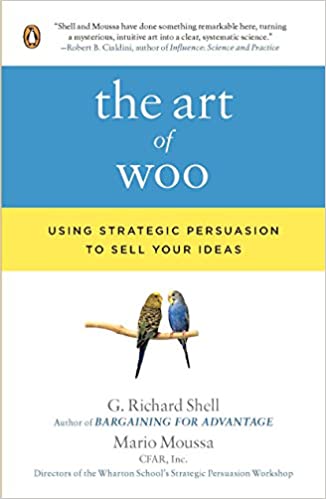“The Art of Woo: Using Strategic Persuasion to Sell Your Ideas” focuses on the art of persuasion and negotiation, providing readers with practical strategies and techniques for effectively influencing others and selling their ideas, products, or services.
Understanding the Importance of Persuasion
Persuasion is a critical skill in various aspects of life, including business, sales, and leadership. Persuasion involves understanding others’ motivations, emotions, and perspectives to effectively influence them. Successful persuasion requires building trust, credibility, and rapport with others.
Persuasion is not about manipulation or coercion, but rather about building meaningful relationships and finding win-win solutions. Mastering the art of persuasion can lead to improved communication, negotiation, and collaboration skills.
Handling Objections
Anticipating and addressing objections is a crucial aspect of persuasion. Objections can arise from various sources, including skepticism, doubt, or resistance to change.
Being prepared to handle objections with evidence, logic, and empathy strengthens persuasive efforts. Acknowledging and addressing objections with respect and understanding shows credibility.
Preparing for Persuasion
Preparation is a key element of effective persuasion. Before attempting to persuade others, one must understand their needs, interests, and concerns. Proper preparation involves conducting research, gathering information, and anticipating objections.
Identifying and addressing potential obstacles in advance increases the likelihood of success in persuasion. Strategic preparation allows for adapting and tailoring the persuasion approach to different situations and audiences.
Understanding Others
Understanding others’ perspectives and emotions is essential in persuasion. Empathy and perspective-taking allow for better connection and rapport with others. Being attentive to others’ needs, interests, and concerns helps tailor persuasive efforts.
Acknowledging and validating others’ viewpoints and emotions fosters trust and understanding. Understanding others’ perspectives enables finding common ground and identifying shared interests.
Building Relationships
Building relationships based on trust, respect, and mutual understanding is crucial to persuasion. Genuine connections create a solid foundation for successful persuasion. Active listening, empathy, and emotional intelligence are vital in building relationships.
Taking the time to understand others’ perspectives and concerns fosters meaningful connections. Strong relationships lead to increased credibility, influence, and long-term success in persuasion.
Adapting to Different Styles
Adapting to different communication styles and preferences is crucial in persuasion. People have different ways of processing information and making decisions. Understanding and adjusting to others’ communication styles enhance persuasive efforts.
Being adaptable and flexible in persuasion allows for better alignment with others. Customizing the persuasion approach to match the audience increases the likelihood of success.
Effective Communication
Communication is a key component of persuasive efforts. Clear and compelling messages are more likely to resonate with others. Tailoring communication styles to match the audience increases the effectiveness of persuasion.
Non-verbal cues, such as body language and tone of voice, play a crucial role in communication. Active engagement and two-way communication foster understanding and create opportunities for persuasion.
Building Credibility
Credibility is crucial in persuasion, as people are more likely to be influenced by those they trust. Building credibility involves demonstrating expertise, integrity, and reliability. Trustworthy behavior, consistency, and transparency contribute to building credibility.
Using evidence, data, and examples to support arguments enhances credibility. Being mindful of one’s reputation and character is critical in establishing trust in persuasion.


Member discussion: